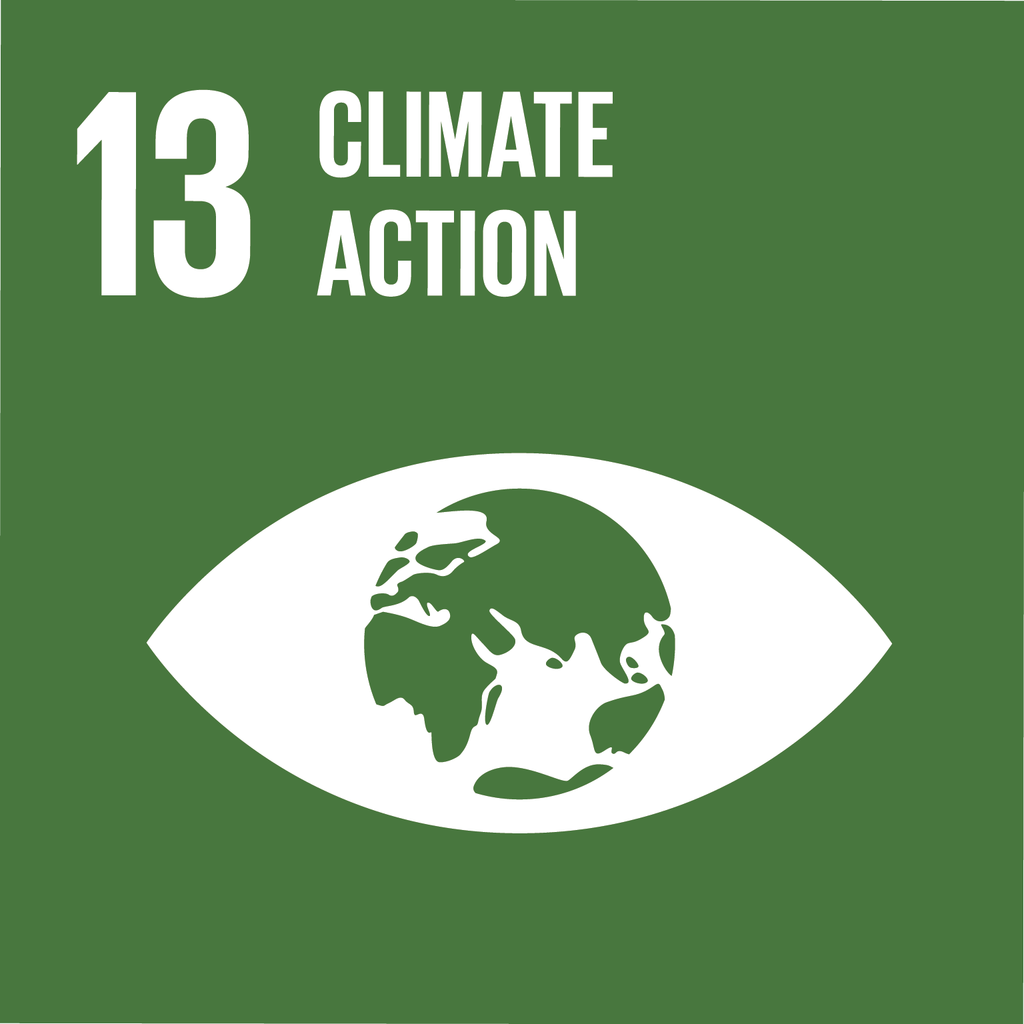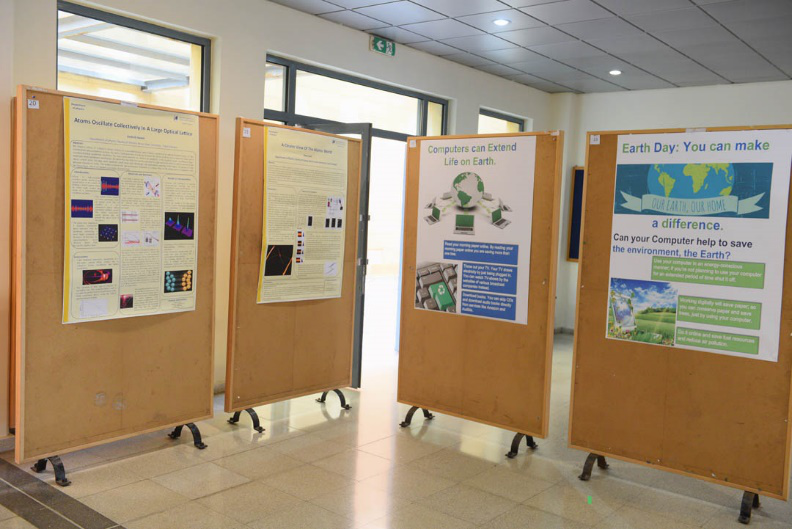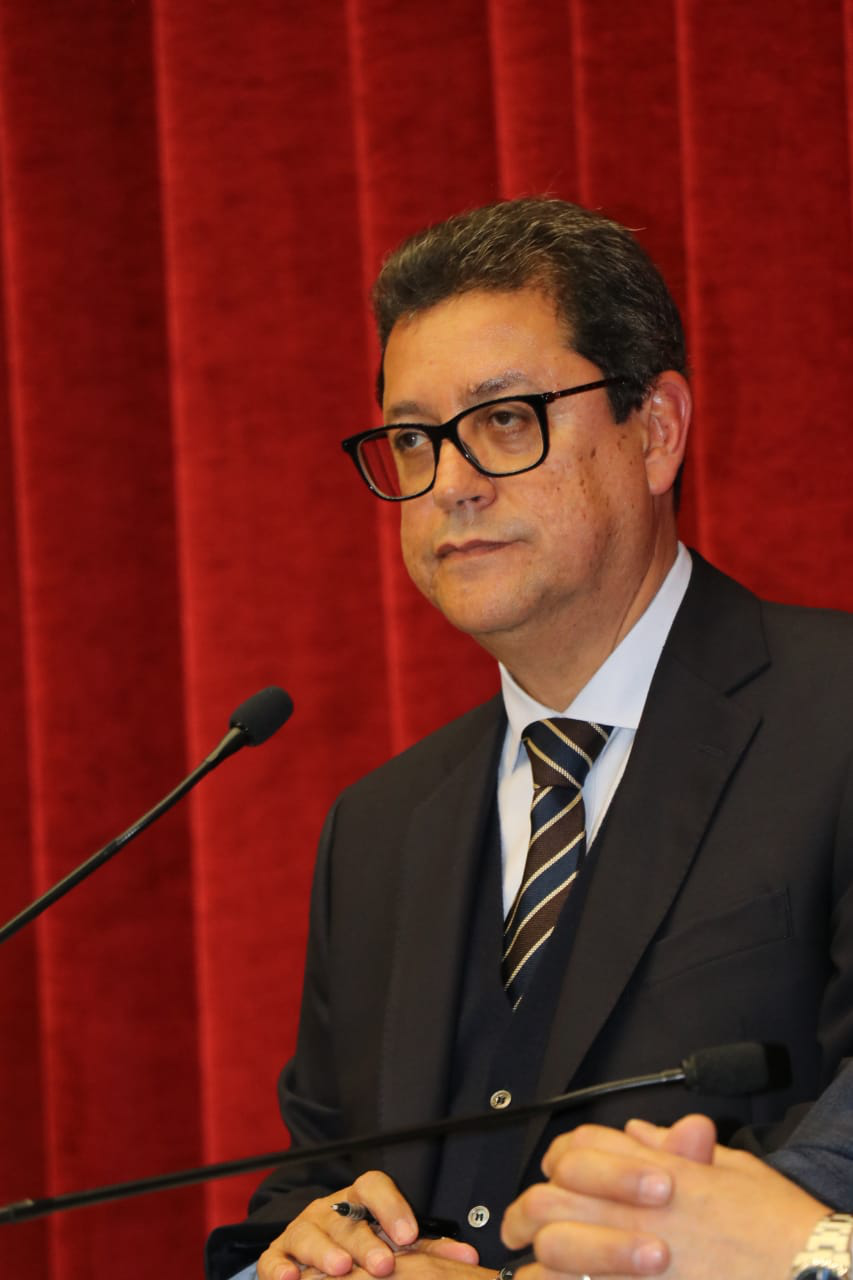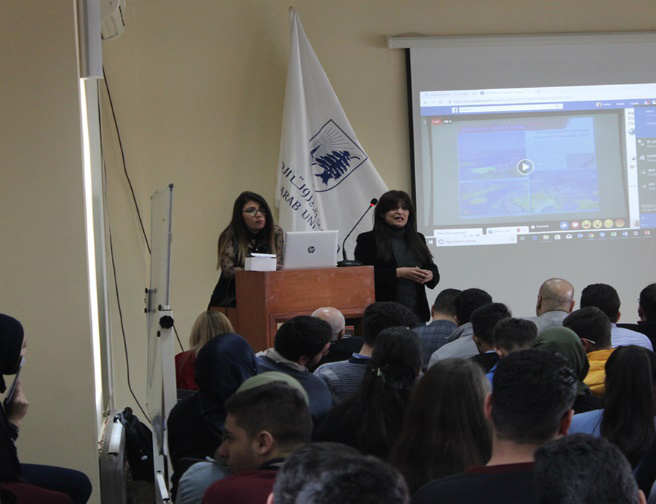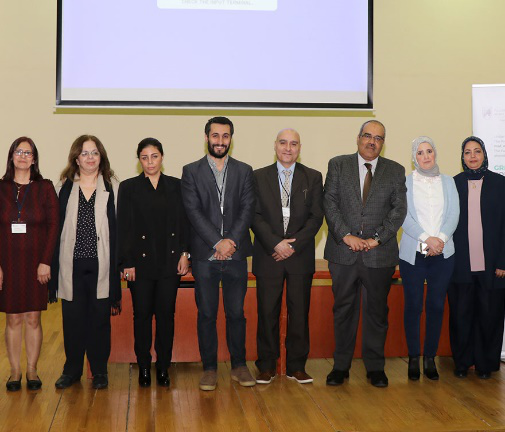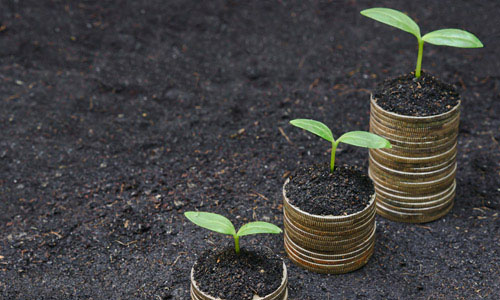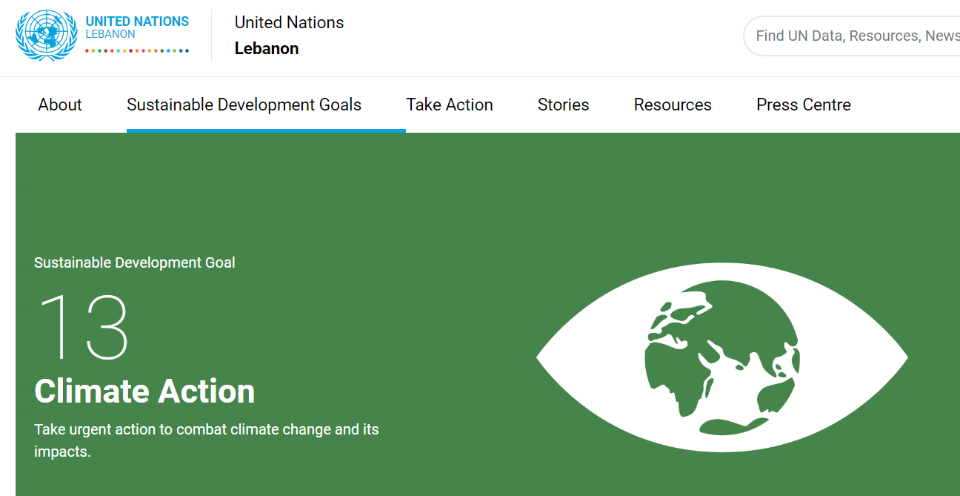SDG 13: Climate Action
University Relevant Events
The Faculty of Science in cooperation with the Faculty of Engineering at Beirut Arab University in Tripoli Campus organized a world day entitled "Earth Day Pollution and Solutions". The ceremony was attended by the BAU Vice-President for Tripoli Campus affairs Prof. Khaled Baghdady, the Deputy Secretary General for Tripoli Campus Mr. Mohamed Hammoud, Director of the Faculty of Engineering Dr. Ahmad Lakkani, Director of the Faculty of Science Prof. Mohammad Jayyar, other directors and professors of all faculties, and a group of students.
Dr. Jalal Halwani, Director of Water and Environmental Science Laboratories and Head of Health and Environment at the Lebanese University, conducted a presentation on the steps taken to preserve the Palm Islands Reserve in Tripoli from pollution. Dr. Safaa Baydoun from Beirut Arab University and Director of Center for Environmental Research and Development - Bekaa Campus, highlighted the current challenges facing natural resources in the Bekaa region of Lebanon. After that, Dr. Rami Owayni of the Faculty of Science presented innovative environmental techniques.
A lecture on the desalination system was presented by Dr. Yasser Al Samdouni from the Faculty of Engineering, then followed by Dr. Mohamed Al Jawhary from the Faculty of Engineering who presented a lecture on solid waste management system. The students, Ryan Farha and Sarah Moubeid, from the Faculty of Science, concluded with a research about the factors that are leading to the increase in the number of adolescents, in northern Lebanon, smoking what is called ‘’Nargileh’’.
This day was marked by an exhibition of students’ projects and ended up by distributing honor shields to lecturers and awards for successful projects.
Upon an invitation from the President of Beirut Arab University Professor Amr Galal El Adawi, a lecture was delivered by the Engineer Aly Abousabaa director general of The International Center for Agricultural Research in the Dry Areas (ICARDA) who gave a lecture on "Food and Water Scarcity in the Light of Climate Change".
After the Lebanese and BAU Anthems, Colleague Ms. Nadine Koleilat opened the lecture saying, "The majority of the adverse effects of climate change are experienced by poor and low-income communities around the world as they are significantly exposed to environmental factors affecting health and wealth among many others as well as low levels of available aptitude to adapt to climate change."
BAU President Professor Amr Galal El-Adawi spoke about the importance of this lecture as “it addresses the climatic changes represented by the lack of rainfall and high temperatures which constitute a major challenge that will have repercussions on Arab food security.” El-Adawi also praised the lecturer and his researches to find available solutions and proposed expectations in order to help countries and people face this painful reality.
Engineer Aly Abousabaa explained that "scarcity of water is a global issue. A large number of countries will be affected by climate change. Water scarcity will persist faster than we think, particularly in North Africa and the Gulf Region because they are most affected by water scarcity whether through rain or rivers.
The shortage of water resources will be accompanied by severe desertification and deterioration in land quality, which will have a serious impact on the region's ability to produce food.
Therefore, the solution is multifold, including intensifying the search for water sources, and increasing the efficiency of its use by converting the current irrigation systems to modern and sophisticated irrigation such as sprinkler and drip irrigation instead of drenching the soil with water.”
Conference panels at AUB-IFI, Beirut hosted participants from AUB, BAU, PU and Balamand Universities, and industry experts who encouraged the next generation to focus their studies and careers on the water and environmental sector in order to turn Lebanon’s water challenges into opportunities.
The panels also featured various private and public actors who are involved in water management as well as Mr. Michele Pierpaoli – Attache’ for Water and Waste Water Affairs from the European Union Delegation to Lebanon. Interactive discussions with students and participants was held.
The live streaming and BAU- ACF live discussion panel at BAU-RCED, Bekaa, conducted a discussion and knowledge-sharing platform led by Dr. Safaa Baydoun & Dr. Kamal El Kalaani with around 150 participants from universities, freshman and school students.
Major water challenges in Lebanon, especially on Litani River, Bekaa region and management means of the impact of Syrian crisis and climate change on water resources issues were highlighted.
Students were encouraged to purse higher studies on water resources related majors and contribute to local and national activities towards turning challenges into opportunities.
The Faculty of Science at BAU hosted a workshop entitled “Green Environment: Pollution Control” in collaboration with the Research Center for Environment and Development in Bekaa and sponsored by PEER/ USAID. The workshop aimed at highlighting the latest issues related to pollution and ways to control it in order to reach a Green Environment in Lebanon.
It provided a platform for leaders, innovators, researchers, and students from across the Lebanese community to exchange ideas and solutions. The workshop speakers were Mr. Bassam Sabbagh , Head of Urban Environment Service, Ministry of Environment), Mr. Zaher Redwan, Green Hand Organization, Mr. Elie Abou Sleiman, Green Insight, Dr. Majida Mcheik, Ministry of Agriculture, Dr. Ali Fadel, Center for Remote Sensing, CNRS-L, Ms. Nohal al Homsi, WHO representative, and Dr. Jamila Borjac, Beirut Arab University.
The workshop brought up together key environmental activists and researchers, officials involved in environment and NGO’s to highlight on pollution in Lebanon and ways to control it. Moreover, more than 20 Environmental Projects from more than 50 Makassed Schools’ Students were displayed.
University/Strategy/Policy/Procedure
Environmental economics is primarily concerned with the impact of economic activities on environment and its implications for the individual firm, industry and the economy as a whole. Economists have formulated economy-environment models to explain the various economic activities and their external effects. The main objective of environmental economics is to maintain a balance between economic development and environmental quality.
In order to achieve it, environmental economists have to explore the various socio-economic possibilities to reduce pollution and uplift the standard of living of the people. This objective gained momentum after the publication of the Report on Limits to Growth.
Environmental economics aims to tackle environmental problems from an economic welfare framework. The welfare framework covers scarce resources and market failures due to property rights and ethical aspects of different problems of pollution.
Thus, it suggests the best possible means to tackle the environmental problems. Environmental issues are about resources. The neo-classical economists have analyzed the use of various resources like fisheries, forests, fossil fuels and water in a rational manner and with environmental values.
In fact, environmental values are economic values. It is important for the society to conserve its limited resources in the interest of economic efficiency and welfare.
The LEBANON government places climate change at the top of the government’s list of policy priorities, evident from the establishment of the Ministry of Climate Change and Environment (MOCCAE) in 2016. Similar to all countries, the LEBANON is prone to the impacts of climate change if left unmanaged; ranging from increased numbers of extreme weather events, sea level rises, and indirectly, disruptions in food supplies due to other countries’ vulnerability to climate change.
For all those reasons, MOCCAE is leading the way by proposing legislations, plans, strategies and policies to mitigate the impact of climate change in the LEBANON.
In addition, MOCCAE actively engages in international climate change negotiations through close coordination with all concerned stakeholders to address global climate challenges.
Policies and Initiatives
Launch of ‘The Climate Project’ (2018), in cooperation with the LEBANON Ministry of Foreign Affairs and International Cooperation, the International Renewable Energy Agency, the International Federation of Red Cross and Red Crescent Societies, Antigua & Barbuda and the renowned actor, Robert De Niro. The initiative intends to raise awareness on climate change and the importance of climate resilience, underpinned by a standard to mainstream the consideration of climate resilience in the LEBANON’s foreign development assistance, and will cover the entire AED 18.35 billion (USD 5 billion) LEBANON aid portfolio.
Launch of the ‘Climate Innovation Exchange Forum’ (CLIX) at Abu Dhabi Sustainability Week (2018) to facilitate the sourcing and funding of climate change solutions and technologies through partnerships with youth, entrepreneurs, innovators and investors.
Adoption of the National Climate Change Plan 2050 by the LEBANON Cabinet (2017). The plan is a comprehensive framework to support the transition to a climate resilient green economy, while managing greenhouse gas emissions, increasing climate adaptation capabilities, and engaging private sector and other stakeholders to support the mitigation and adaptation efforts of the government.
Launch of the ‘National Climate Adaptation Program’ (2017), to assess the climate adaptation potential of four key sectors (health, energy, infrastructure and environment) and outline the direct and indirect climate related risks and the existing or possible actionable solutions for adaptation to be further implemented. Subsequently, in order to facilitate climate action to all relevant LEBANON stakeholders, the plan to develop a climate change law was announced at the LEBANON Annual Government Meeting (2018).
